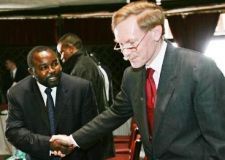Darfur talks to extend beyond deadline
May 2, 2006 (ABUJA) — A senior U.S. official said he would continue negotiations on a peace plan for Sudan’s Darfur region on Wednesday, indicating a Tuesday deadline for an agreement would slip.
 “I will be here tomorrow (Wednesday), beyond that I don’t know,” U.S. Deputy Secretary of State Robert Zoellick told reporters on Tuesday evening.
“I will be here tomorrow (Wednesday), beyond that I don’t know,” U.S. Deputy Secretary of State Robert Zoellick told reporters on Tuesday evening.
The government of Sudan has accepted an 85-page draft settlement but three Darfur rebel factions refuse to sign, saying they are unhappy with the proposals on security, power-sharing and wealth-sharing.
Zoellick and Britain’s International Development Secretary Hilary Benn held back-to-back meetings with the sides and observers said their involvement could jolt the rebels into accepting the peace plan.
“They need to make the hard decisions for peace so that the killing can be stopped,” said State Department spokesman Sean McCormack in Washington.
Mediators say the rebels insist some of their demands, such as a vice president’s post and a regional government, be met in full although months of negotiations have shown compromises with Khartoum are necessary.
Zoellick declined to say how long the talks might now last, noting his role was to try to bridge gaps between the sides.
“I will only continue to do that if I see we are in a position to try and accomplish that,” he said.
There was no immediate confirmation of the apparent changed deadline from the AU.
The 2300 GMT deadline, already put back by 48 hours, had been expected to slip as AU Chairman Denis Sassou Nguesso, the president of Congo Republic, and commission head Alpha Oumar Konare — were due to arrive in Abuja on Wednesday.
Observers say failure to get a deal would be disastrous.
“Nobody will look good, the AU, the government or the (rebel) movements, but the real victims will be the people on the ground,” said Sam Ibok, head of the AU mediation team.
“They will not be able to return to their homes to cultivate their lands. They will have to spend more time in camps. Security will deteriorate. Women will continue to be exposed to rape and children will continue to suffer,” he said.
European Union foreign policy chief Javier Solana spoke on the phone with three rebel leaders on Tuesday and urged them to seize the opportunity in Abuja.
CHAD CRISIS
The rebels took up arms in early 2003 in ethnically mixed Darfur, an arid region the size of France, over what they saw as neglect by the Arab-dominated central government.
Khartoum used militias, known as Janjaweed and drawn from Arab tribes, to crush the rebellion. The fighting has killed tens of thousands of people while a campaign of arson, looting and rape has driven more than 2 million from their homes into refugee camps in Darfur and neighbouring Chad.
Diplomats said one of the main stumbling blocks to a peace agreement was that Minni Arcua Minnawi, leader of the most powerful of the three rebel factions, was being undermined by some of his former allies because of a crisis in Chad.
Minnawi is a tribal ally of Chadian President Idriss Deby, who is battling an insurrection by fighters he accuses of fronting for Sudan. But Minnawi’s friends in Chad accuse him of abandoning Deby and selling out to Khartoum, which makes it difficult for him to sign any deal.
Washington, which labels the violence in Darfur “genocide”, is intensifying efforts to resolve the Darfur conflict.
President George W. Bush has called his Sudanese counterpart to emphasize U.S. commitment to a deal and the need for a robust U.N. force to take over peacekeeping in Darfur from a 7,000-strong AU force, White House spokesman Scott McClellan told reporters. Khartoum has so far rejected the idea.
In Abuja, Zoellick joins U.S. diplomats trying to engineer a last-ditch deal whereby the sides would trade concessions on two contentious security issues.
Under a U.S. proposal, a part of the AU draft requiring the government to disarm the Janjaweed before the rebels lay down their weapons would be amended to better suit the government.
In return, Khartoum would accept a detailed plan for integration of specific numbers of rebel fighters into the Sudanese security forces. This is a key rebel demand.
(Reuters)
